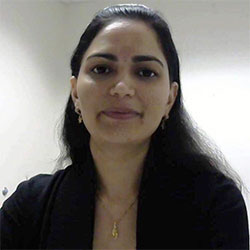
Contact Us
Institutional Communications
Bureau of Mines Building, Room 137
Laramie, WY 82071
Phone: (307) 766-2929
Email: cbaldwin@uwyo.edu
UW’s Diksha Shukla Receives NSF CAREER Award to Study Human Brain Functions
Published June 11, 2024

Diksha Shukla
A University of Wyoming faculty member is conducting research that aims to enhance our understanding of human brain functions.
Diksha Shukla, an assistant professor of computer science in UW’s Department of Electrical Engineering and Computer Science, recently was awarded a $563,906 Faculty Early Career Development (CAREER) Program Award from the National Science Foundation (NSF). NSF’s Secure and Trustworthy Cyberspace Program within its Division of Computer and Network Systems recommended Shukla for the award.
Shukla will receive continuing grant funding for her project, titled “CAREER: BrainCAPTCHA: Completely Automated Test for User Verification Using Dynamic Brain Biometrics.” The grant began June 1 and ends May 31, 2029.
The research aims to develop secure, lightweight and user-friendly authentication methods using electroencephalogram (EEG) brain signals.
“We are working on the foundational science and developing algorithms needed to understand user brain behavior and make it possible to utilize brain signals for user authentication, with a special focus on implementing these systems for augmented reality and virtual reality technologies,” Shukla says. “This involves understanding how brain signals can uniquely identify individuals and creating the technology to use these signals effectively for authentication. Another important task in this research is developing a threat model and testing for various possible threats, including privacy issues. A longer-term goal of this research is to design methods that facilitate seamless and secure brain-computer interaction.”
The research goals of this project lie in understanding hidden relationships that brain signals have with the corresponding internal and external stimuli and designing algorithms to use these relationships for user identification and lay the foundation for a secure human-computer interface for the next generation of technologies, she says.
“One of the prominent outcomes I envision is the integration of EEG-based authentication systems into emerging technologies and computing devices,” Shukla says. “This will allow us to use our brain signatures for authentication instead of current methods, such as PINs, passwords, facial recognition or fingerprints. Additionally, this research will pave the way for future transformative directions, such as using brain signals as a means of interacting with technology.”
The research is being conducted on campus, says Shukla, who will serve as principal investigator of the grant. For the first two years of the grant, two UW graduate students will be supported with funding. One UW graduate student will be supported for the duration of the project. One or two UW undergraduate students will work on the project every year of the grant as well.
During this project, Shukla will work with an external collaborator with neuroscience expertise. She says she looks forward to establishing new collaborations with experts in psychology and other neuroscience fields.
Reaching Out
As part of the NSF CAREER Award, Shukla will conduct some public outreach. She plans to develop modules related to security and machine learning, which will be incorporated into existing courses. Additionally, she plans to initiate a “Secure Computing Education” seminar that will cover topics from this CAREER project.
“Furthermore, I will conduct rural outreach by creating research experiences for undergraduate students and high school teachers on these topics,” Shukla says. “These efforts will help establish long-term relationships with rural districts.”
The CAREER Program offers NSF’s most prestigious awards in support of junior faculty who exemplify the role of teacher-scholars through outstanding research, excellent education and the integration of education and research within the context of the mission of their organizations. Such activities should build a firm foundation for a lifetime of leadership in integrating education and research.
“The NSF CAREER Award is a significant milestone for me both personally and professionally. Personally, it is a recognition of my dedication and hard work in my research field, which is incredibly rewarding and motivating. It affirms my belief in the potential of my work and boosts my confidence to push the boundaries further,” Shukla says. “Professionally, the award provides invaluable support and resources that will allow me to advance my research on EEG-based authentication systems. It opens opportunities for new collaborations with leading experts in neuroscience and psychology. Overall, it will help to establish me as an expert in my field, fostering long-term research and teaching excellence.”
Shukla received her Ph.D. in computer and information science and engineering from Syracuse University; her master’s degree in mathematics from Louisiana Tech University; another master’s degree in computer applications from Jawaharlal Nehru University in New Delhi, India; and her bachelor’s degree in mathematics and physics from Kanpur University in Kanpur, Uttar Pradesh, India.
Contact Us
Institutional Communications
Bureau of Mines Building, Room 137
Laramie, WY 82071
Phone: (307) 766-2929
Email: cbaldwin@uwyo.edu
